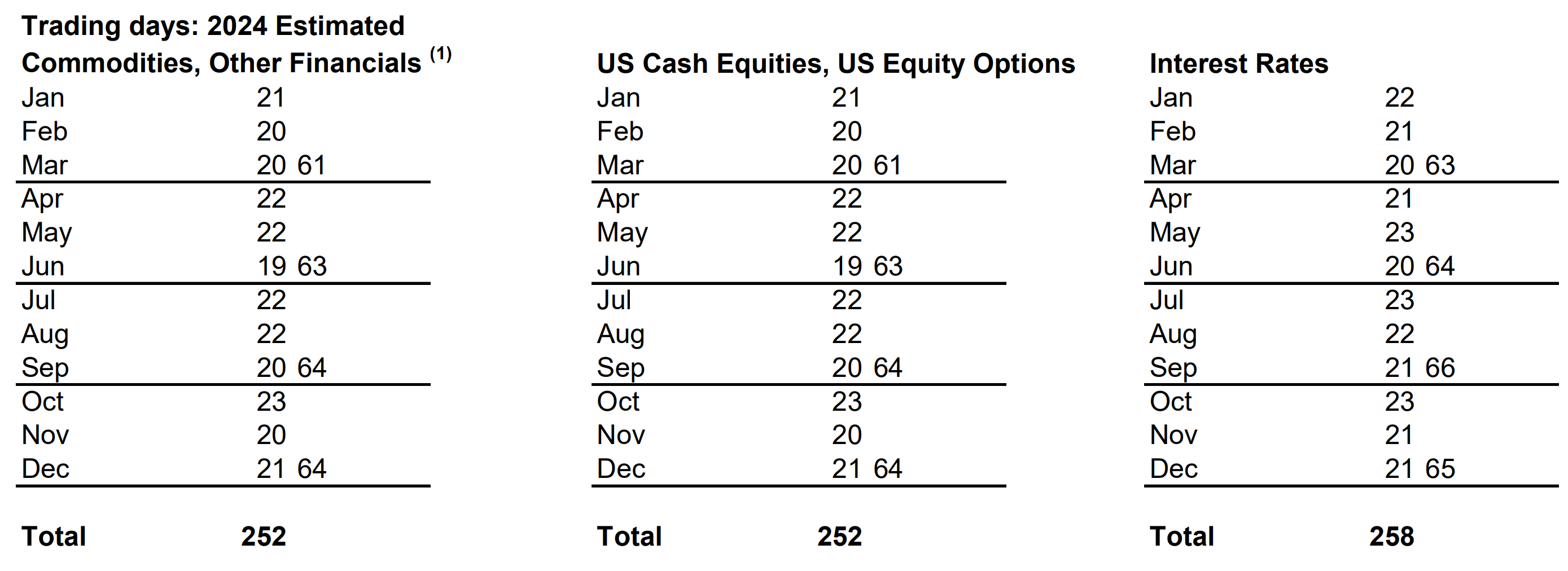What are the Stock Market Holidays for 2024?
It’s a common question that investors have as it seems like the stock market is closed on some holidays but not others. While the New York Stock Exchange observes most public holidays, don’t assume that the markets are closed on every one of them.
In 2024, the US stock market will be closed on 10 different occasions to observe public holidays. A majority of these holidays will fall on Mondays. It's also important to note that this a leap year.
Holidays and Trading Hours NYSE
The New York Stock Exchange is the largest stock exchange in the world. Both the New York Stock Exchange and the NASDAQ are based in New York and observe the same trading hours during each session. Both exchanges are also closed for the same public holidays each year.
Here is a list of the holidays observed by the NYSE and NASDAQ for 2024:
|
Public Holiday
|
2022 Calendar Date
|
|
New Year’s Day
|
Monday, January 1st
|
|
Martin Luther King Jr. Day
|
Monday, January 15th
|
|
Washington’s Birthday
|
Monday, February 19th
|
|
Good Friday
|
Friday, March 29th
|
|
Memorial Day
|
Monday, May 27th
|
|
Juneteenth National Independence Day
|
Wednesday, June 19th
|
|
Independence Day
|
Thursday, July 4th
|
|
Labor Day
|
Monday, September 2nd
|
|
Thanksgiving Day
|
Thursday, November 28th
|
|
Christmas Day
|
Wednesday, December 25th
|
How Do Holidays Affect the Stock Market?
When the US stock market observes a public holiday it is completely closed for the session. Stock prices do not move and no shares can be bought or sold when the markets are closed. You often see higher buying or selling action into the close of a session before a holiday or holiday long weekend.
For this reason, you should stay aware of when markets will be closing ahead of time. If market participants are heading out for a long weekend, this could also affect market liquidity before the holiday begins.
How Many Trading Days in a Year: 2024?
The trading hours are from 9:30 AM EST to 4:00 PM EST on days that the stock market is open. These trading hours are observed from Monday to Friday, on regular business days. Some pre-market and post-market trading happens, but these are not included in the official hours that the stock market is considered open.
On average the NYSE and NASDAQ are open for trading for around 253 days each year. There happen to be 252 trading days in 2024. Here is an estimated chart from the NYSE:

What Days Is the Stock Market Closed in 2024?
The US stock market will observe most of the regular public holidays in 2024, but not all of them. These include New Year’s Day, MLK Day, George Washington’s Birthday, Good Friday, Memorial Day, Juneteenth National Independence Day, Independence Day, Labor Day, Thanksgiving Day, and Christmas Day.
In addition to this, the stock markets are closed on Saturdays and Sundays each week throughout the year.

How to Calculate the Number of Trading Days in a Year
Calculating the number of trading days in a year requires accounting for several factors. Here's the basic approach:
- Start with 365 days: This is the total number of days in a year (excluding leap years).
- Subtract weekends: There are 52 weeks in a year, and each week has 2 non-trading days (Saturdays and Sundays). This amounts to 52 * 2 = 104 non-trading days.
- Subtract holidays: Stock markets close for various holidays throughout the year. The exact number varies depending on the exchange and country. In the US, there are typically around 10 holidays observed by major exchanges.
- Adjust for leap years: Every 4 years (except for century years not divisible by 400), an extra day is added to the calendar (February 29th). This can add one trading day to the year.
Using this basic approach and assuming 10 holidays in the US: 365 days - 104 weekends - 10 holidays = 251 trading days (not considering leap years). Remember, the exact number of trading days can vary slightly depending on your chosen method and specific considerations.
How Can I Trade When the Stock Market Is Closed?
We're so glad you asked! That's what we're here for. At TradingSim, we keep the market open 24/7, 365 days per year. As the world's most realistic market simulator and replay, you can get those reps in any time you want, weekends or holidays.
There's no better way to practice trading, replay markets, and analyze your strategies than with TradingSim. Take advantage of our free trial and join us in the simulator today.











 Day Trading Basics
Day Trading Basics 
